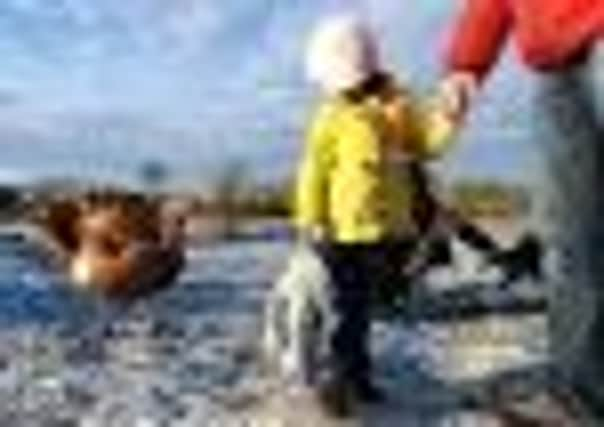Adopt a turkey, name it, watch it grow – then eat it


The scheme means that customers, who pay £15 for the turkeys’ lodging and food for the six months that they live at the farm before being slaughtered, can watch their festive lunch grow before their eyes as the turkeys roam around. The initiative is part of a trend to make consumers aware of the connection between how their food is produced and what they eat. In a well-publicised TV experiment, celebrity chef Gordon Ramsay allowed his young children to look after a herd of pigs before they were consumed by his family.
Heather Anderson, who co-owns Whitmuir Farm, said it was “ridiculous” that most diners did not want to acknowledge that what they were eating was not once alive.
Advertisement
Hide AdAdvertisement
Hide Ad“Most people are delighted to see the turkeys and to see that they’re well looked after,” she said. “If there’s any squeamishness it’s from the adults, not children. They understand ‘that’s my turkey, that’s what I’m going to see at Christmas’.


“By paying for their bed and board you’re acknowledging that it takes six months of care and attention to raise these birds – it’s a downpayment on us looking after your Christmas dinner.”
Anderson said many who chose to adopt a turkey also gave them names. “We’ve had turkeys named Horace, Ethel, even Christmas Dinner. Quite a few women who come in want to name their turkeys after their husbands,” she said.
Sonya MacDonald, 30, who has visited the farm every week with her fiancé Mark and their two-year-old daughter Ella Rose since adopting a bird in June, said the family had christened their turkey Bonzo after the Led Zeppelin drummer John Bonham.
“We were really thrilled to be able to come and visit our turkey. Our daughter really enjoyed seeing them,” said MacDonald. “She’s a little too young to understand that this is a more ethical option than buying something from the supermarket, but what’s great is that she’ll grow up thinking this is how it should be, that you see the animals happy and free and that they end up on the dinner table.”
The farm tries to match up specific birds with its customers but it can’t give firm guarantees. “We chose one but we’re not sure which one it is now as they are all in together,” MacDonald said.
But not everyone agrees with naming the turkeys. David Richards, from Penicuik, who has also adopted a turkey for this year’s Christmas dinner table, said it was a step too far.
“I know some people name the turkeys but we decided it would be a bit much. I’m not sure you’d want to name something that you know you’re eventually going to eat.”
Advertisement
Hide AdAdvertisement
Hide AdHowever, he said the scheme offered a more palatable alternative to the types of birds that many supermarkets offer.
“We weren’t happy with the way a lot of birds were kept during and up to Christmas and wanted to do something different.
“Now we can see the turkeys virtually from day one to the finished product. You know they’re not being force-fed, they’re not overcrowded or pecking each other to death. It’s a far more wholesome and satisfying business.”
The birds at Whitmuir are bought at one day old and kept in an indoor “brooder”, which contains a heat lamp, until they are around five weeks old. They are then moved to a bigger shed with outdoor access, and finally to a cattle shed where they have use of a field.
“They are quite happy to roam about and sometimes wander all the way down to the carpark, and the farm dogs sometimes try and round them up” Anderson said. “They also fly – unlike the majority of turkeys, and the regular exercise means the meat has a much better flavour as it’s far more evenly distributed on the animal’s body and the muscle tone is much better too.”
Intensive turkey farming is still the most popular way for turkeys to be produced. “Ten million turkeys are sold in the UK each year, and of these, 90 per cent are reared intensively,” said Laura Stewart, director of the Soil Association Scotland.
“However, recent retail market figures demonstrate a 5.8 per cent rise in organic poultry sales. People are increasingly concerned about animal welfare and where their food comes from.”
Despite the pampering, there is no happy ending for the Whitmuir birds. Most of them were slaughtered this weekend in time for them to be prepared for the dining table at a cost of £11 per kilo. But Anderson insists they had a nicer time than most of their kind. “If you’re going to eat an animal you have some responsibility to make sure that animal had the best possible life when it was alive,” she said.
Twitter: @emmacowing